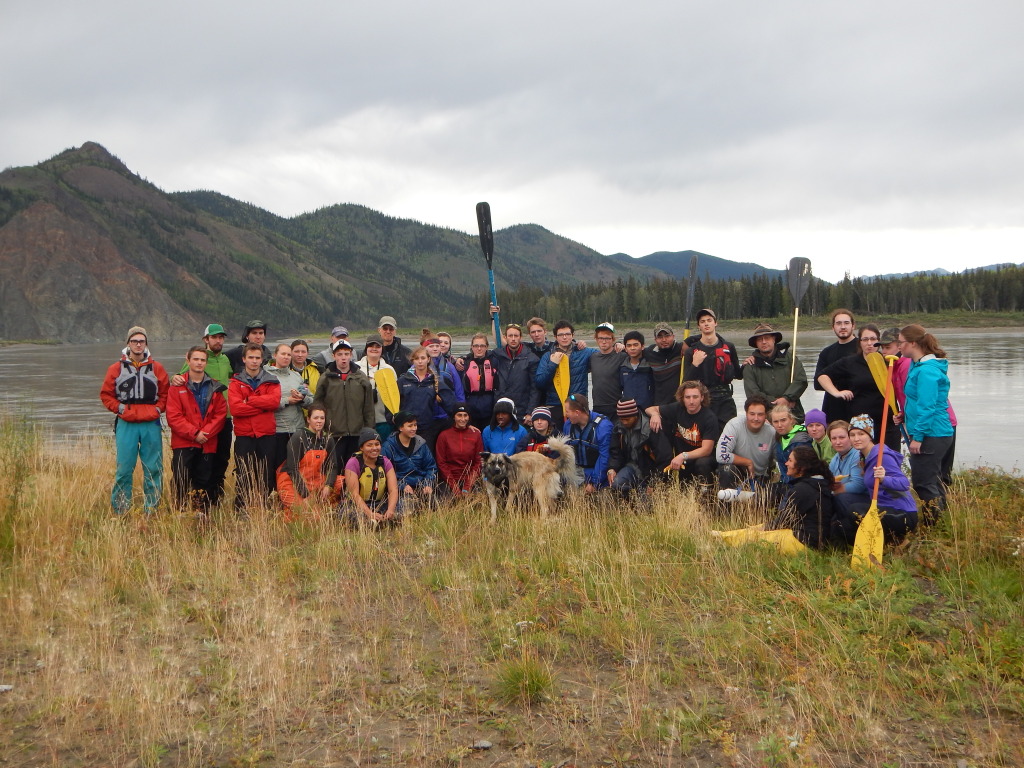Launched by Alaska Pacific University in 2013, Expedition Alaska is a one-of-a-kind classroom experience that, for the second time this fall, will take first year and sophomore transfer students into the heart of the Alaska wilderness.
In combining academics with back country adventure, Expedition Alaska is designed to build lasting bonds between new students while introducing them to key concepts of APU’s philosophy of Active Learning, such as: community, creativity, leadership, faculty-student collaboration and the deep connection between learning and hands-on experience.
Here’s how it works: Students enrolling in Expedition Alaska choose an introductory field course from options in Environmental Science, Sustainability Studies and Outdoor Studies for the four-week fall block intensive. During the first week, students spend mornings in their separate classes while afternoons bring together the full expedition group for briefings and trip preparations that include water and wilderness safety as well as sorting and packing the food and gear provided by APU for their journey. At the end of week 1, Expedition Alaska will load everything up and head off campus for an extended float and paddle trip on the Yukon River.
This fall, the back-country journey will again start in Eagle, a former goldmine town 50 miles south of the Arctic Circle, and end at Circle, in the Alaskan Interior. The trip covers roughly 150 miles of the Yukon River during the height of the region’s autumnal beauty, crossing terrain and water suitable for beginning adventurers. Students and faculty will hold classes in the open by day and set up camp on gravel bars at night.
“The Yukon float is an actual expedition, sharing travel beyond the domesticated world,” says Liberal Studies professor, Tim Rawson, who developed the idea for Expedition Alaska with Outdoor Studies professor, David McGivern. “But it also functions as a metaphor for the larger objective, the years of college study, and all the learning that goes into that.” Rawson and McGivern both participated as faculty on Expedition Alaska 2013.
“There was plenty of student apprehension prior to departure,” Rawson continues. “We had students who had never camped out, let alone camped out in Alaska. Even for our Alaska residents, none had done a trip like this. There were questions about body odor, clean clothes, sleeping on the ground and, of course, bears. The faculty were interested in seeing how the students would respond to being beyond the communications grid. We anticipated, and were proven correct, that these worries would be inconsequential. Once we pushed off into the river, the rhythms of the wilderness took over. It created an exemplary learning experience.”
Rawson returns to Expedition Alaska this fall to teach Human Dilemma: Introduction to Sustainability. He will be joined by his colleagues and first time participants, professors Leslie Cornick (Marine Biology) and Mike Kaplan (Outdoor Studies).
“I am very excited to teach the Natural History of Alaska section of our Expedition Alaska program this year!” says Cornick. “I’ll be experiencing the Yukon and this part of interior Alaska for the first time right along with new students—it will be wonderful to have a chance to see things with common eyes. I’m also very excited at the opportunities for our new students—across all majors—to get to know each other, discover how strong and smart they really are, and build their learning and social community as they embark on one of the most exciting times in their lives.”
“I’m looking forward to all of it,” says Mike Kaplan, who will be teaching the Expedition Alaska course reserved for Outdoor Studies majors. While the group will begin their journey together on August 30th, students enrolled in Cornick’s and Rawson’s courses will exit the river on September 9th as Kaplan’s crew, paddling canoes, continues their Yukon adventure for another week.
“I want to set the right tone when it comes to introducing world-class adventure,” Kaplan said. “I also want to design a compelling progression of skills while linking wilderness expedition to the academic competencies that our department upholds.”
Expedition Alaska 2014 will include APU Outdoor Program Coordinator and APU alumna Raina Panarese, OS student Kenny Steck, and APU alumni Janelle Dyer and Sarah Douglas.
“Expedition Alaska courses give APU students hands-on learning they won’t get any place else,” says APU President, Don Bantz, who will join the trip as a faculty member again this fall. “It puts us on the map—literally and figuratively—as a university that understands how student success depends on a rewarding transition to college life.”
Look for more stories about Expedition Alaska 2014 as the adventure gets underway in the coming weeks, and make sure to check out Expedition Alaska’s home on the APU website.

